Dark Water (2002)
Directed by: Hideo Nakata
Written by: Hideo Nakata, Ken'ichi Suzuki, Kôji Suzuki, Takashige Ichise, Yoshihiro Nakamura
Starring: Asami Mizukawa, Hitomi Kuroki, Mirei Oguchi, Rio Kanno
AKA HONOGURAI MIZU NO SOKO KARA
Japan
AVAILABLE ON DUAL FORMAT BLU-RAY AND DVD: NOW, from ARROW VIDEO
RUNNING TIME: 97 min
REVIEWED BY:Dr Lenera, Official HCF Critic
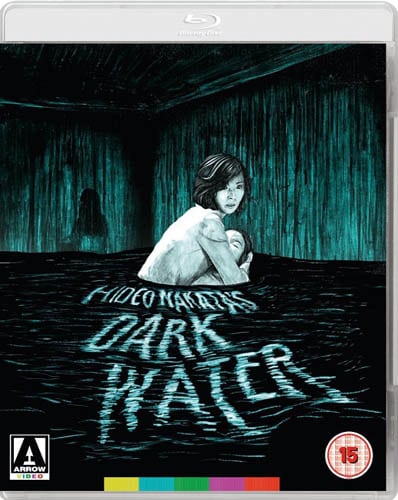
Yoshimi Matsubara, in the midst of a divorce, moves to a run-down apartment with her daughter Ikuko, and, enrolling her in a nearby kindergarten, starts working as a proof reader, a job she held years ago before she was married. The ceiling of the apartment has a leak, which worsens on a daily basis. Matsubara complains to the janitor, but he does nothing to fix the leak. She then tries to go to the floor just above her apartment to find out the root of the leak, and discovers that the apartment is locked. Strange events start to happen: a red bag with a bunny on the front reappears no matter how often Yoshimi tries to dispose of it, hair is found in tap water, and Yoshimi gets glimpses of a mysterious long-haired girl who is of a similar age to her daughter…..
We get so many films in to review on HCF that it’s possible to miss the odd one, and I discovered a screener of Dark Water, which came out on Blu-ray over a month ago, under a pile of unwatched discs the other day, so my apologies to our readers and the folks at Arrow Video for the extreme lateness of this review. Luckily I had already reviewed this film a few years ago, though was happy to watch this fine ghost story again and re-jig the review a bit….though unsurprisingly I’ve ended up re-writing most of it. My wife would always remind me of the time when she got home late and I was watching Dark Water for the first time upstairs. As she begun to ascend the stairs, she heard me cry out “SHIT”!!! at the top of my voice and jump out of my skin….and promptly went back downstairs again till the film had finished. It was a simple shot of a ghost flying at someone, which sounds stupid but which knocked the stuffing out of me because of the atmosphere that had been built up. Dark Water isn’s a cinematic ghost story of the Insidious and Poltergeist school which are the filmic equivalent of a ghost train, leaving you shaken and exhausted by the time the end credits come up. Instead, it’s more in the vein of films like The Innocents and The Others – though perhaps even more low-key – which scare more through atmosphere and suggestion. These films also often tend to have a melancholy aspect which come to the fore as the films approach their end, and Dark Water may not contain a climax which is absolutely terrifying the first time you see it like director Hideo Nakata’s Ringu, but it does – and I’ve seen it three times now – have me in tears at the end. I don’t think that, overall, it’s a great a film as the brilliant Ringu, but it’s still a little gem in its own right and does succeed in its attempt to create a more emotional, human story.
Like Ringu, Dark Water was based on writing by Koji Suzuki. This time the source was a horror anthology of short stories, all concerning ghosts who are connected to water, called From The Depths Of Dark Water, which is what the title of the film translates as in Japan. The first story, Floating Water, was the one that was adapted, and it seems that the only major thing that was changed was the ending, which was made more complex. For much of the time, instead of expanding the story, it was decided to stretch it out, with long periods in the film where little happens. I don’t mean that automatically as a bad thing: this approach can work very well in a film like this. The story was also turned into a manga. Actress Asami Mizukawa read the screenplay and wasn’t sure whether she liked it until she came to one particular scene which she loved and which made her do the film. When shooting commenced, the script had been revised and that particular scene cut out. The very convincing Shining-inspired scene of being swamped by water coming out of a lift was done by having little Rio Kanna sit there and the water made to flow downwards so it wouldn’t sweep her away. The film was released in the midst of the J-horror craze just before Ju-On: The Grudge, and was another big hit. The Americans of course rushed to remake it but this time the reboot really missed the mark, trying too hard to be scary [but not really succeeding] and missing much of the subtlety and beauty of the original. Nakata used many of the same themes and ideas in Ring Two, his sequel to the The Ring the US remake of Ringu, and even recreated a scare in a bath, but the results were uneven.
Kenji Kawai’s title music of a few repeated percussive notes played over a sound which resembles water in pipes or distant machinery, music which re-occurs throughout the film to strange effect, immediately gets the viewer in the right frame of mind and the very first shot of Yoshima as a child, presumably having been abandoned at day care, staring out the window at the pouring rain, is a superb example of how one single shot can evoke so much. Flash forward to some years later, and Yoshima is involved in divorce procedures with her husband Kunio, and one thing that impresses is that Kunio’s attitude and actions seem quite reasonable. At one point Yoshima is late picking Ikuko up from school so the headmaster calls Kunio, who comes along and begins to take her to his house until Yoshima runs after him and grabs Ikuko from him. It’s possible to side with Kunio against Yoshima because the latter, who spent time in a psychiatric hospital in the past, seems overly fragile, sometimes on the verge of a mental breakdown, and perhaps not somebody who should be looking after a small child yet – as in Britain – custody tends to favour the mother no matter what.
Almost as soon as Yoshimo and her daughter Ikuko move into their new home, there is a palpable sense of unease, though much of this again is down to the music which seems to blur the devision between sound design and scoring. The ‘holding the wrong hand’ gag first employed in The Haunting get a really good work-out in the first of several chilling bits in a lift, but it’s also one of many little moments that almost pass you by and you ask yourself: “did I really see that”? Ikuko runs out of the lift and into the streets, smiling at the ghost she’s probably either seen, or sensed, a lovely reminder of the fact that young kids tend to have no fear of such things, and that ghosts need not be scary. The tension, calm and measured, makes things like a girl’s red bag constantly showing up all over the place the creepiest happenings in the world. Ikuko’s first full sighting of the ghost girl in the yellow mac [shades of Don’t Look Now] outside as rain pours down, is bathed in yellow light, giving the scene a sense of supernatural awe rather than fear. There are a few more traditionally frightening moments later, often helped by blurring the ghost’s face. One bit where Yoshimo is temporarily trapped in a lift and glimpses the ghost may have inspired the scariest scene in Annabelle. Despite all this the film remains almost tranquil. The climax, when it comes, is over very quickly, but emphasises emotional rather than excitement. There is a bit where Ikuko thinks that her mother has rejected her, and the look on her face and her cries should move anyone with a heart.
Dark Water is really about nothing less than our need for love, its coda sequence, set some years later, thereby being essential to the film. There’s also the message that one must face the repressed in order to eliminate it, otherwise it will haunt you all your life. The story depicts a mother coming to terms with her traumatic past which has bubbled to the surface due to recent events, and making the best decision possible to protect her daughter from a possibly unpleasant future. It does all make sense and ends with some closure, but it can also be interpreted in other ways and set the mind thinking. In fact, as this quietly disturbing but rather delicate tale ended last night, this tim earound I wondered if the ghost in the film is actually somebody other than who we are told she is, and whether Yoshima is a much darker character than she appears to be. Despite having made Ghost Actress before Ringu and some more horror films afterwards, Nakata once stated: “If you were to ask me whether I love horror from the bottom of my heart, I would have to say no”. Perhaps the phenomenal success of Ringu typecast him and he ended up making films he didn’t really believe in. Dark Water certainly comes across as the work of a filmmaker who put his ‘all’ into it. It does overtly reference other horror films more than usual for his work, three of which I’ve already named, but one of his skills is in using all this other material and making it the building blocks for something new. Dark Water is a film steeped in the history of the horror movie, but which also feels unique and totally Japanese.
Cinematographer Junichiro Hayashi shoots much of the film with soft focus, giving it a dreamlike feel. Hitomi Kuroki gives a superb performances as Yoshimo. She has a pretty face, but one that seems to carry underlying pain, and you always believe in her very well drawn, yet possibly ambiguous, character. Rio Kanno seems a little mechanical at first as Ikuko but then it’s a hard role for any young child to play, and she eventually comes through towards the end. Dark Water is a horror film that requires your full attention. Built more on psychological turmoil than things that go bump in the night, it’s probably not one to watch with a load of mates and beers, partly because it is extremely slow paced, and partly because it just wouldn’t frighten much. However, on my own late at night with the lights turned off, it certainly works for me, not in a ‘climbing the walls’ sort of way, but in a way where chills slowly flow through the body and your mind works overtime. Many decisions and events are detailed through implication or a line of dialogue rather than being stated overtly, and some things you just have to assume. This pared down approach means the viewer has to work a little harder than normal, but it is well worth it if you’re willing to play along. Its universal themes of love and sacrifice really touch the soul as presented here.
Rating: 









Arrow’s Blu-ray of Dark Water seemed technically a little disappointing to my eyes. While the soft hazy look was obviously intented by the filmmakers, as were the often deliberately drab colour schemes, there is also some ghosting when characters move which is very surprising to see on a new release of a film on Blu-ray, though how much of this is down to the nature of the original materials I have no idea. Sound is fine though and there’s a decent selection of special features. The new interviews, which talk about Ringu as much as Dark Water, are insightful. Arrow were obviously able to add two more archival interviews to the one with Hitomi Kuroki at the last minute as the details about the special features I’ve seen only list the one. They’re quite fun to watch, but my favourite of all the extras is the ‘making of’, which is just lots of fly on the wall footage, with no commentary, of quite a few scenes being filmed. It’s really interesting, but please don’t see it until you’ve seen the film, as it shows off some of its highlights!
SPECIAL EDITION CONTENTS
*High Definition digital transfer
*High Definition Blu-ray (1080p) and Standard Definition DVD presentations
*Original 5.1 audio (DTS-HD on the Blu-ray)
*Brand new interview with director Hideo Nakata
*Brand new interview with novelist Koji Suzuki
*Brand new interview with cinematographer Junichiro Hayashi
*Archive interview with actress Hitomi Kuroki
*Archive interview with actress Asami Mizukawa
*Archive interview with writer of end title song Shikao Suga
*Original ‘Making of’ documentary
*Trailer
*Reversible sleeve featuring original and newly commissioned artwork by Peter Strain
*First pressing only: illustrated collector’s booklet containing new writing by David Kalat, author of J-Horror: The Definitive Guide to The Ring, The Grudge and Beyond, and an examination of the American remake by writer and editor Michael Gingold

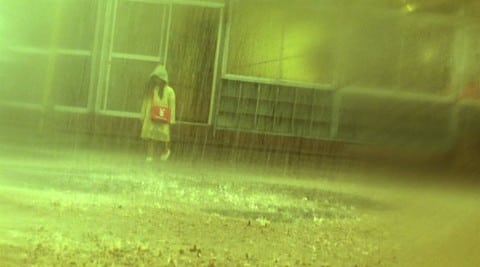
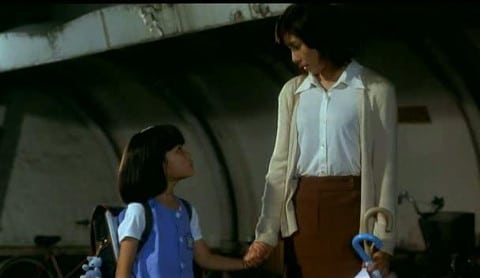


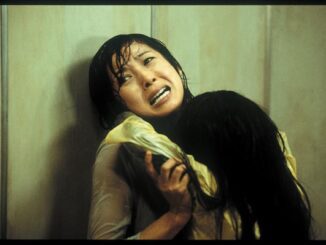
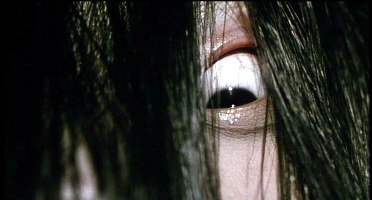
I can’t move, breathe, speak or hear and it’s so dark all the time. If I knew it would be this lonely, I would have been cremated instead.